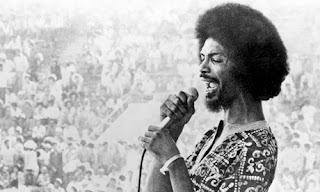Tell me/Who’ll pay reparations on my soul?/Who’ll pay reparations/‘Cause I don’t dig segregation/but I can’t get integration/I got to take it to the United Nations/Someone to help me away from this nation/Tell me/Who’ll pay reparations on my soul? ~ Gil Scott-Heron, “Who‘ll Pay Reparations For My Soul?,” Small Talk at 125th and Lenox (1970)
Scott-Heron’s legacy is often reduced to him being the Godfather of Hip-Hop/Rap, but there is so much more to him and his literary and musical contributions than that. His work, ever culturally, socially, and politically conscious, served as honest, thought-provoking reflections of the times. In one of the most astute profiles of Gil Scott-Heron,”The Devil and Gil Scott-Heron,” Mark Anthony Neal says,
For all of our memories of Scott-Heron’s political impact, his music covered a full gamut of experiences. A track like “Lady Day and Coltrane” paid tribute to Black musical traditions, while songs like “A Very Precious Time” and “Your Daddy Loves You” found Scott-Heron thinking about issues of intimacy. Well before proto-Harlem Renaissance writer Jean Toomer would be recovered by scholar and critics, Scott-Heron set Toomer’s Cane to music. Even as young activists make the connection between Black life and environmental racism, Scott-Heron offered his take on the plaintive “We Almost Lost Detroit.”
His work represented for his/our people. It evoked the sentiments and oft-underrepresented (or unheard) perspectives of his/our people. And like Stevie Wonder (one of his idols), Marvin Gaye, and Donny Hathaway, Scott-Heron’s work proved that you could still reach the people the with music of substance and contemporary relevance.
So here’s to you Gil Scott-Heron! The revolution goes on!
Discography (studio albums):
Small Talk at 125th and Lenox (1970), Pieces of a Man (1971), Free Will (1972), Winter in America (1974), The First Minute of a New Day (1975), From South Africa to South Carolina (1976), It’s Your World (1976), Bridges (1977), Secrets (1978), 1980 (1980), Real Eyes (1980), Reflections (1981), Moving Target (1982), Spirits (1994), I’m New Here (2010)
Bibliography:
The Vulture (1970), Small Talk at 125th and Lenox (1970), The Nigger Factory (1972), So Far, So Good (1990), Now and Then: The Poems of Gil Scott-Heron, The Last Holiday (2012)

